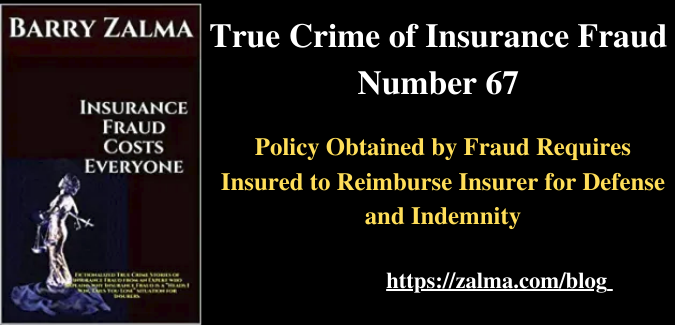True Crime of Insurance Fraud Video Number 67

True Crime of Insurance Fraud Video Number 67
Read the full article at https://lnkd.in/gGGaFsrx and See the full video at https://lnkd.in/g7fUEcV4 and at https://lnkd.in/gdPmp6rT
Published on May 5, 2022
Policy Obtained by Fraud Requires Insured to Reimburse Insurer for Defense and Indemnity
Posted on May 5, 2022 by Barry Zalma
Diverting from stories where I was personally involved this story comes from the U.S. Tenth Circuit Court of Appeal.
At a mediation Aminokit’s attorney, Jerad West, pressured Evanston to pay the full $260,000 settlement amount demanded by the plaintiff Lassley by threatening to bring a bad-faith claim against Evanston. In the communications that followed, Evanston made clear to West that if it settled the case, it would “seek reimbursement for the entire cost of defense and indemnity.” Faced with the deadline and threat of bad faith litigation Evanston agreed to fund the $260,000 settlement, while reserving the right to seek full reimbursement from Aminokit.
The Tenth Circuit concluded that it would have been “economically unreasonable” for Evanston to refuse to pay the settlement because doing so would have placed Evanston at risk of a bad-faith lawsuit and its insured of a verdict larger than the settlement amount if the case went to trial.
Insurance fraud perpetrators should never be allowed to profit from the fraud. Since the policy was subject to rescission or voidance as a result of a blatant and admitted fraud, the insured had no right to defense or indemnity.
The Tenth Circuit enforced the right to reimbursement and, hopefully, the defendants have sufficient funds to pay the judgment. Since Aminokit did not respond to the insurer’s suit and allowed a default judgment to be rendered, the chances of collecting the judgment are slim.
If the insurer is unable to collect the judgment the fraud succeeded.
ZALMA OPINION
The tort of bad faith often prevents, because of the threat of punitive damages, insurers to allow themselves to be willing victims of fraud. In the case where the victim gets a judgment against the fraudsters is a deterrent, it is only useful if the fraudsters have any assets that the insurer can collect. Best to ignore the threat and take your chances if the insurer has sufficient evidence to establish it was defrauded.
(c) 2022 Barry Zalma & ClaimSchool, Inc.
Barry Zalma, Esq., CFE, is available at http://www.zalma.com and [email protected].
Subscribe to Zalma on Insurance at locals.com https://lnkd.in/gn5WAi6C.
Subscribe to Excellence in Claims Handling at https://lnkd.in/gNm9EWKJ.
We are 100% funded for October.
Thanks to everyone who helped out. 🥰
Xephula monthly operating expenses for 2024 - Server: $143/month - Backup Software: $6/month - Object Storage: $6/month - SMTP Service: $10/month - Stripe Processing Fees: ~$10/month - Total: $175/month
- Art
- Causes
- Crafts
- Crime
- Dance
- Drinks
- Film
- Finance
- Fitness
- Food
- Jogos
- Gardening
- Health
- Início
- Literature
- Music
- Networking
- Paranormal
- Outro
- Politics
- Stories
- News
- Party
- Science
- Religion
- Shopping
- Sports
- SyFy
- Politically Incorrect
- Philosophy
- Theater
- Technology
- Wellness



